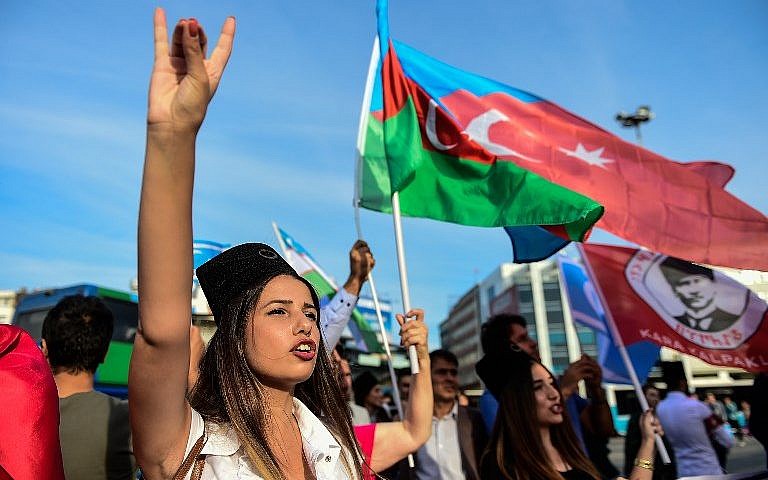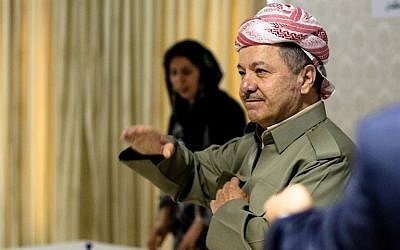Turkish leader says his country could halt Iraqi Kurdistan’s oil exports over independence vote, which he calls ‘matter of survival’

Turkish President Recep Tayyip Erdogan threatened a military intervention in Iraq in response to the Iraqi Kurdish region’s referendum on independence from Baghdad.
Erdogan, speaking at a conference in the Turkish capital of Ankara as Iraqi Kurds voted in their region on Monday, said that Kurdish independence was unacceptable to his country and that this was a “matter of survival.”
He pointed to Turkish military exercises currently taking place on Turkey’s border with the Iraqi Kurdish region.
Erdogan said: “Our military is not (at the border) for nothing.” He also added: “We could arrive suddenly one night.”
He also said Turkey would take political, economic as well as military measures against Iraqi Kurds’ steps toward independence and also suggested that Turkey could halt oil flows from a pipeline from northern Iraq.
Erdogan said: “Let’s see where — and through which channels — will they sell their oil. We have the valve. The moment we shut the valve, that’s the end of it.”
The Turkish leader said a border crossing with Iraq had been closed in one direction and that Turkey would shut it entirely.
Turkish Prime Minister Binali Yildirim also commented on the Kurdish independence referendum, saying his country is considering closing down its airspace as well as a border gate to northern Iraq.
Yildirim said on Monday that officers and experts from Iraq’s army would join military exercises that Turkey launched along the border in an apparent warning to the Iraqi Kurds.
The Turkish premier said Ankara would from now on “enter a strong” dialogue with Baghdad, saying it regarded the central government in the Irai capital as the legitimate authority over border crossings, airports and oil trade in the Kurdish region.
He said Turkey had received a formal request from Baghdad requesting the closure of the airspace and border crossing. Yildirim also suggested that Turkey would take action if the Turkmen population came under attack or if Turks encountered “obstructions or problems” at the border crossing.
Despite the threats from Turkey, Iraqi Kurds went ahead with their independence referendum Monday, defying warnings from Baghdad and their neighbors in a historic step towards a national dream.

The nonbinding vote, initiated by veteran leader Massud Barzani, has angered not only Iraq’s federal government but also neighboring Turkey and Iran, who are concerned it could stoke separatist aspirations among their own sizable Kurdish minorities.
The United States and other Western nations have also raised concerns, saying the vote could hamper the fight against the Islamic State terror group in which cooperation between Baghdad and the Kurds has been key.
Left without a state of their own when the borders of the Middle East were redrawn after World War I, the Kurds see themselves as the world’s largest stateless people.
The non-Arab ethnic group number between 25 and 35 million people spread across Iraq, Iran, Turkey and Syria.

Iraqi Prime Minister Haider al-Abadi on Sunday pledged to take all the “necessary measures” to protect the country’s unity as his government urged all countries to deal only with it on oil transactions.
Abadi said the Kurds’ unilateral decision to stage a referendum affected both Iraqi and regional security, and was “unconstitutional and against civil peace”.
Hours later, the Iraqi government called on all countries “to deal only with it on matters of oil and borders”.
The Iraqi Kurds export an average 600,000 barrels per day (bpd) through a pipeline running through Turkey to Ceyhan on the Mediterranean.

Iranian news agency IRNA said Iran’s President Hassan Rouhani had called Abadi late Sunday to reiterate his support.
But Barzani said the Kurds’ “partnership with Baghdad” since the ouster of dictator Saddam Hussein in a 2003 US-led invasion had failed.
He however said the vote was “not for defining borders or imposing a fait accompli.”
“We want a dialogue with Baghdad to resolve the problems, and the dialogue can last one or two years,” Barzani said of zones such as Kirkuk.



Leave a Reply
You must be logged in to post a comment.